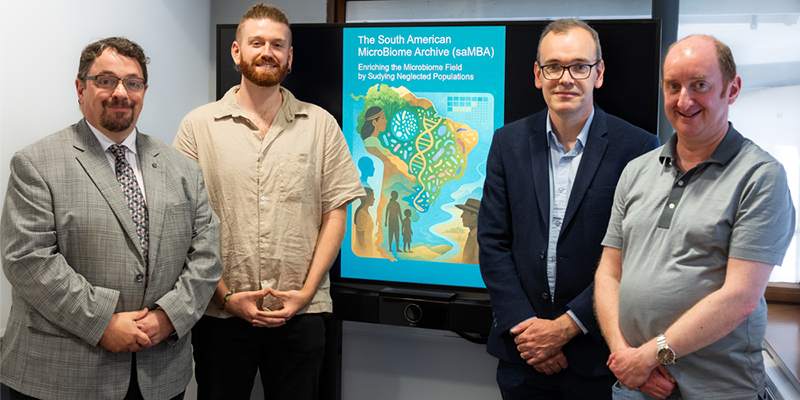UCC researchers develop the largest archive of gut microbiomes in South America

The gut microbiome plays a central role in human health and disease, but major gaps remain in mapping their diversity across the globe.
Now researchers at APC Microbiome Ireland, a world-leading Research Ireland centre based at University College Cork (UCC) have developed a new microbiome archive for South America - one of the world’s most microbiome-diverse regions but also among the least studied.
Published in Nature Communications, saMBA (The South American Microbiome Archive) addresses the disparity and imbalance in global microbiome research, with over 70% of sequenced human microbiomes originating from Europe and North America, which together represent only 15% of the world’s population.
The saMBA archive has also generated the most accurate assessment of regional biodiversity to date and provides guidelines on where new global sampling efforts are most needed – an analysis that is the first of its kind.
The study which is the brainchild of UCC PhD student and Chilean native Benjamin Valderrama involved screening the international nucleotide sequence database collaboration (INSDC) and manually curating a list of 33 gut microbiome studies from South America, 73% of which had not been included in any previous compendium and greatly expands the current understanding of the gut microbiome. The researchers recreated the internationally recognised HMC (Human Microbiome Compendium) workflow, and followed the HMC quality criteria to filter projects, samples, and sequences, thus facilitating the comparison between resources. This approach enables the saMBA framework to be compatible with existing global resources, and it is openly available, thus promoting the inclusion of other underrepresented populations to accelerate microbiome research globally. "South America’s gut microbiome diversity is unparalleled — and now, it’s finally on the global research map," says Professor John Cryan senior author on the study
The manual curation of studies included in saMBA allows for the addition of 24 studies not included in previous archives, highlighting the need for the manual curation of studies metadata for more accurate assessments of regional microbiomes. Additionally, several findings from the saMBA analysis will advance the global understanding of what a healthy gut microbiome looks like and deepen the understanding of regional microbiome diversity.
- The saMBA study involves the identification of over 1,000 potentially new bacterial genera that had not previously been described as part of the gut microbiome in South Americans.
- Through a comparison with global datasets, the saMBA study found that South America is the most biodiverse region in terms of gut microbiota.
- Estimates from the saMBA study suggest an incomplete understanding of the complexity of the gut microbiome in the region.
- The saMBA analysis also determined which countries are most likely to reveal new bacteria if additional samples are collected. This is a crucial step in prioritizing future research and especially important in regions where scientific funding is limited.
"saMBA can accelerate microbiome research around the world, with potentially far-reaching benefits for public health. The intestinal microbiome influences a wide range of health conditions, making it a promising avenue for new therapies. I am excited about where the field is heading but it is essential that everyone, regardless of geography, can access that progress," says Valderrama, a theme echoed by Cryan "If microbiome science is to benefit everyone, it must include everyone. This is more than a dataset — it’s a step toward a truly global, inclusive microbiome science that can benefit all."
UCC Research
Aistriú Taighde
Contact us
Office of Vice President for Research & Innovation, 4th Floor, Block E, Food Science Building University College Cork, T12 K8AF
